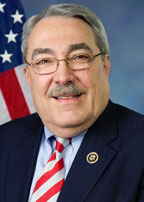
 CBC seeks GOP cooperation on economic challenges
CBC seeks GOP cooperation on economic challenges
Rep. G. K. Butterfield, said, “We’ve got to get smarter on crime and there are some Republicans who get that.” (Courtesy Photo)
By Freddie Allen, NNPA Senior Washington Correspondent
WASHINGNTON, D.C. (NNPA) – Working across the aisle with Republicans on criminal justice reform might be the best shot that the Congressional Black Caucus (CBC) has to address the economic challenges facing the Black community before the 2016 presidential election, according to the head of the caucus
“We are having bipartisan conversations on the whole question of criminal justice reform,” said Rep. G. K. Butterfield (D-N.C.), the chairman of the CBC. “There is a group of Republican members that are thoughtful and they are beginning to think through the broken criminal justice system that we have and they are now indicating to us their willingness to engage in some type of legislation that will begin to address it.”
As states and jurisdictions weigh the financial burden of mass incarceration against more fiscally responsible criminal justice policies, more lawmakers are considering diversionary programs, decriminalizing small amounts of marijuana to decrease the load on their jails and court systems, and making it easier for ex-offenders to find jobs that pay a living wage after they’ve paid their debt to society.
The Vera Institute of Justice, an independent research and policy group, reported that taxpayers in 40 states shelled out nearly $40 billion in FY2010 to cover the costs of housing inmates and running prisons and jails.
Butterfield speculated that some of his Republican colleagues might just be playing politics with criminal justice reform, but he still welcomed their support.
“We’ve got to get smarter on crime and there are some Republicans who get that,” said Butterfield, adding that the U.S. Congress might see a viable, bipartisan bill on criminals before the August break.
The Joint Economic Committee, a bipartisan panel that studies the U.S. economy, laid out the economic challenges facing the Black community in a recent report. The committee is composed of 10 senators and 10 members of the House of Representatives.
“More than half (51.4 percent) of Black families with children under 18 are headed by a single mother, compared to one-fifth (19.1 percent) of white families with children, and nearly 47 percent of families headed by a Black single mother are in poverty,” stated the report.
The report continued: “The median income of African American households is just $34,600 – nearly $24,000 less than the median income of white households. Black Americans are almost three times more likely to live in poverty than white Americans.”
The report said that at the peak of the Great Recession, one in six Blacks was unemployed.
“African-American homeowners who took out mortgages between 2004 and 2008 were almost twice as likely as white homeowners to have lost their home to foreclosure by 2011, according to the Center for Responsible Lending, the report stated. “One-in-10 Black homeowners who took out mortgages at the height of the housing boom eventually lost their home to foreclosure.”
The report also included a state-by-state analysis of the poverty and unemployment rates for Blacks and whites.
The poverty rate for Blacks was highest in Maine at 50.7 percent (1.4 percent Black population) compared to the white poverty rate, which was 13.2 percent. According to the report, Blacks living in Hawaii (2.5 percent of the population) had the lowest poverty rate at 5.8 percent and the poverty rate for white was 11 percent.
In Washington, D.C., where 48.8 percent of population is Black, the Black unemployment rate is 15.1 percent, five percentage points higher than the national average for Blacks in the labor force.
The jobless rate for Blacks was the highest in Wisconsin at 19.7 percent (6.2 percent Black population), more than four times higher than the 4.3 percent white jobless rate. Although the unemployment rate for Blacks was the lowest in Utah at 1.7 percent (1.6 percent Black population), the poverty rate for Blacks was 34.5 percent in the state, compared to a 9.9 percent white poverty rate.
Maryland was the only state where more than 30 percent of the population is Black and the unemployment rate was less than the national average. In Mississippi (35.9 percent Black), Georgia (31.2 percent Black) and Louisiana (31.3 percent Black) the Black jobless rate was higher than the national average.
Although Rep. Butterfield said that he wasn’t surprised by most of the findings in the report, the wealth gap between Blacks and Whites was stunning.
According to the report, “White households typically have 13 times more wealth than black households. In 2013, the median net worth of African American households was only $11,000 compared to about $142,000 for white households—a difference of $131,000.”
When it comes to solutions to the economic challenges facing the Black community, Rep. Butterfield said that targeted funding leads the list.
In the CBC’s alternative budget for FY2016, the group advocated for the “the use of the 10-20-30 policy for federal spending.”
The plan called for, “at least 10 percent of the federal funds in certain accounts be directed to certain areas that have had a poverty rate of 20 percent for the last 30 years.”
The Community Development Financial Institutions Fund (CDFI), a bipartisan program crafted to promote access to capital for businesses and economic growth in low-income underserved communities, determined that 20 percent or more residents in 384 counties, many of them in the South and governed by Republican lawmakers, have lived in “persistent poverty” for more than 30 years.
Under the direction of the Secretary of Agriculture Tom Vilsack, the United States Department of Agriculture developed the “StrikeForce Initiative for Rural Growth and Opportunity” in an effort to tackle rural poverty, especially in communities where the child poverty rate was roughly 25 percent.
“Since 2010, these efforts have invested over $16.5 billion to create jobs, build homes, feed kids, assist farmers, and conserve the natural resources across twenty states,” according to the USDA’s website. “In 2015, StrikeForce expanded to include Oklahoma and Puerto Rico.”
More than $6.5 billion were invested in StrikeForce states in 2014 alone. Rep. Butterfield wants to see that program expanded to other federal agencies.
If lawmakers can craft similar programs for the Transportation Department, Health and Human Services and even the Department of Defense, Rep. Butterfield said, “We can begin to see a difference.”
But with the Republicans controlling the House of Representatives and the United States Senate, Rep. Butterfield admitted that finding legislative solutions for problems affecting the Black community is going to be an uphill battle and as both parties rush into 2016 presidential elections those talks may get left behind altogether.
“The tragedy is that we’re now entering the presidential election season and not a whole lot happens during a presidential election season. So our ability to legislate is going to be affected,” said Butterfield.
Rep. Byer continued: “If we are to meet the challenge of the promise of equality in America we need to address these inequities in employment, income, wealth, housing and education through policies designed for inclusive prosperity.”
Butterfield said that designing those policies will take higher levels of civic engagement in the Black community and citizens paying attention to what is happening in the world and connecting it to their lives.
“Once they realize what the politicians are doing will affect their bank account and affect their quality of life, then they will begin to participate in the political process,” said Rep. Butterfield. “But if we go to sleep in 2016 and don’t have the Obama turnout that we had in ’08 and ’12 and we lose control of the White House we’re going to have some painful years ahead that nobody wants to see.”





Be the first to comment